Gum pain
10
July
2021
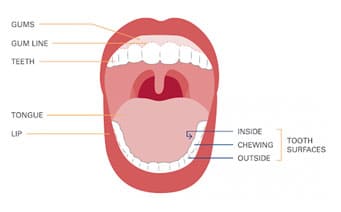
What is Gum pain?
Gum pain can develop for a variety of reasons, some more serious than others. And even though it’s tempting to try at-home remedies to relieve the pain quickly, it’s recommended to visit a dentist as soon as possible to make sure the source of the pain is not an inflammation or a disease.
Causes of gum pain
In order to confirm the reason behind your Gum pain, you need to check with your doctor. You should not ignore it, because it can be a sign of a serious underlying health condition. Here are the most common causes of Gum pain:
-
Cuts or abrasions
Braces, sharp food, toothpicks, or sharp objects may result in gum cuts. In some cases, your doctor may need to do some tests and X-rays to make sure the injury is minor. Depending on the abrasion, you might need stitches. However, if the cut is minor, it’s usually treated with over-the-counter medicine.
-
Gum disease
Gum diseases or infections are the result of poor oral hygiene. A bacterium grows in your mouth and causes you to get either gingivitis or periodontitis.
-
Gingivitis
Gingivitis is a gum disease that comes from poor oral hygiene, poor nutrition or smoking.
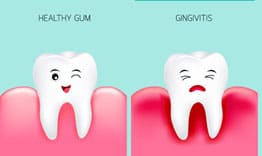
Some of the symptoms of gingivitis are:
-
Sensitive gums
-
Bad breath
-
Swollen gums
-
Gum shrinking
-
Sensitive teeth
This gum disease should be taken seriously and treated quickly because it can lead to periodontitis which is a much more serious infection.
-
-
Periodontitis
Periodontitis is an also the result of poor oral hygiene. It’s a severe inflammation that only worsens over time, if not treated.
Listed below are some symptoms caused by periodontitis:
-
Sensitive gums
-
Pain when chewing
-
Painful abscesses
-
Swollen gums
-
Bad breath
-
Loose teeth
Periodontitis is more dangerous than gingivitis because it can touch and damage the bone.
Preventing gum diseases is easy. You simply need to maintain a good oral hygiene and visit you dentist regularly.
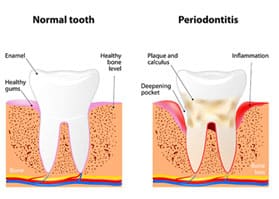
Treatments for gum diseases include taking medication as well as getting your teeth cleaned by your dentist. Professionals will use techniques such as periodontal scaling or root planning in order to deep clean your teeth and remove the bacteria from under the gum. In more extreme cases, surgery is be advised.
Be careful! Smoking lowers your body’s immune system and therefore puts you more at risk of developing gum diseases. It might also cause the treatments to be less effective. Therefore, you should try to eliminate this bad habit completely.
-
-
Periodontal abscess
-
Tenderness of the gum
-
Pain in the gum
-
Discomfort when chewing
-
Unpleasant aftertaste in the mouth
-
Fever
-
Teeth sensitivity
-
Bad breath
-
Canker sores
Canker sores are small ulcers that appear on the gums. Some are minor and heal quickly, others are major and may last for a month or more. Herpetiform canker sores are less usual and they heal in one or two weeks. If you have canker sores, you might feel tingling sensations, pain in your gums, fatigue and sometimes fever. Over-the-counter pain relievers help with the healing of canker sores.
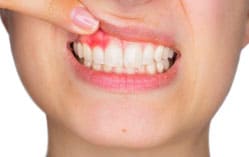
-
Anemia
It has been proven that anemia; a condition that occurs when there’s a lack of red blood cells in the body; affects your oral health.
Different types of anemia can have different effects on your gums and teeth.
Iron deficiency anemia causes your gum to lose its healthy pink color and become paler or even white. Pain is also another symptom you might experience.
Other types of anemia such as sickle cell anemia affect your teeth. Therefore, it’s essential that you consult your dentist and make sure you follow the right treatments to prevent infections.
-
Sinusitis
Sinus infections occur when the tissue lining the sinuses swells.
Sinusitis may cause many symptoms:
-
Dental pain
-
Swelling of the face
-
Runny nose
-
Nasal obstruction
-
Facial pain
-
Bad breath
-
Cough
-
Periodontitis is the main cause of periodontal abscess. Since this gum disease causes the tooth to move away from the gum, bacteria start growing inside the gap.
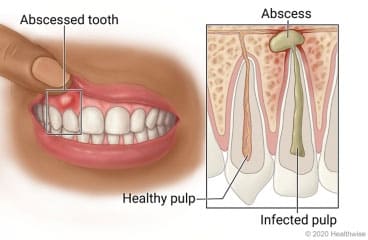
Periodontal abscess causes:
If you experience any of these symptoms, go to your dentist as soon as possible in order to get professional help and treatment.
Since the sinuses, gums and teeth are linked to the same nerves that carries pain signals, whenever you’re suffering from sinusitis, you’re going to feel the pain in your gums or teeth.
Oral cancer
Oral cancer occurs in the lips, gums or throat.
Some symptoms include:
-
Difficulty swallowing
-
Gum pain
-
Lumps in the mouth
-
Bleeding in the mouth
Since those symptoms are also common for gum diseases or sinuses, you should visit your dentist. They know how to tell the difference between minor and serious diseases.
Teething babies
Babies typically start teething between the age of 4 and 7 months.

Some symptoms they might experience are:
-
Changes in sleeping patterns
-
Excess drooling
-
Swollen gum
-
Sensitive and painful gum
-
Fever
-
Rashes
Cool objects such as spoons or teethers are known to help ease the pain.
Pregnancy or menopause
Gum pain is also a symptom that women experiencing menopause or those who are pregnant feel because of the hormonal changes. If the pain gets too extreme, visit your dentist.
Cool objects such as spoons or teethers are known to help ease the pain.
Teeth whitening
Regardless of the teeth whitening technique you’re using; it’s very likely harming your gum.
Some teeth whitening products burn your gums and irritate them, others cause teeth sensitivity.
The safest way to use teeth whitening product is:
- Picking out a product that doesn’t contain peroxide. Read carefully the ingredients list and try to find the least irritating one.
- You can also ask your dentist to guide you or give you custom gel trays to use.
- Avoid putting any product on your gum. If the whitening product touches your gum, wipe it off immediately.
- Avoid using teeth whitening product too often.
Other causes
Brushing your teeth too hard might lead to extreme gum pain as well, as you might bleed yourself during the process.
If the only symptom you experience is gum discomfort, try brushing or flossing your teeth slower and more carefully. You can also purchase toothpaste that’s specifically formulated for those who suffer from gum diseases and sensitivity.
How is gum pain diagnosed?
During your examination, your dentist will:
Ask you about your medical history
Keep an eye out for signs of inflammation
Take an X-ray to evaluate your bone’s health
When to seek help?
Since diseases, infections and more serious issues cause similar symptoms, only a dentist will know exactly what’s going on and where the pain comes from. Therefore, it’s clever to seek professional help as soon as you feel your gum pain increasing.
Which specialist to visit?
Your dentist is the one to visit if your gums are painful or bleeding. They might redirect you to a periodontal specialist in case of inflammation or periodontal diseases.
At home treatments for gum pain
You should always listen to your doctors advise and follow the treatment he prescribes. However, if you need quick and easy ways to ease your gum pain, you can try:
Salt water rinses. The salt water gets rid of any bacteria in your mouth
Tea tree oil has been proven to decrease inflammation and reduce pain
Black, green or hibiscus room temperature tea bags help ease your gum pain
Hot or cold compresses help reduce swelling
How to sleep when suffering from gum pain?
Less distractions, more blood flow and unintentional grinding of your teeth and jaw clenching at night causes you gum discomfort to increase at night.
Some tips to help you sleep better at night:
Taking pain medication prescribed by your doctor will help minimize the pain at night.
If your gums are swollen, ice packs or cold compresses help reduce the inflammation and alleviate the pain.
Keeping your head higher than the rest of your body will prevent the blood from gathering in your head.
Keeping your head higher than the rest of your body will prevent the blood from gathering in your head.
How to avoid gum diseases and inflammations?
Brush your teeth at least twice a day
Frequently floss
Stop smoking
Improve your nutrition
Frequently asked questions
-
How often should I get checkups?
Visit the dentist every six months for a checkup to make sure your teeth and gum are healthy. During this appointment, your dentist will also clean your teeth and remove any tartar buildup.
-
How often should I floss my teeth?
While you should brush your teeth at least twice a day, flossing between your teeth once a day is enough to reach areas of your mouth you can’t reach with a regular toothbrush and clean them. By flossing, you reduce your chances of getting gum diseases, bad breath and tooth decay.
-
Can my oral piercings cause gum pain?
Oral piercings make it easier for bacteria to enter your mouth and cause gum disease.
Whether it’s located on your cheek, tongue, lip or inside your mouth, the piercing affects your gum and teeth badly and can cause inflammations. If you’re willing to take the risk, visit your dentist way more often than usual to make sure everything’s right and healthy.
References:
(Healthwise Staff, Jan 26, 2020). “Toothache and Gum Problems”.
Derived from:
https://www.uofmhealth.org/health-library/tooth
(Jenna Fletcher, Aug 20, 2019). “How to relieve gum pain fast”, Health freelance writer.
Derived from:
https://www.medicalnewstoday.com/articles/326107
(Adrian White, Mar 2, 2020). “How to get quick relief from gum pain”, Herbalist.
Derived from:
https://www.healthline.com/health/quick-relief-from-gum-pain#overview
If you or anyone you know is suffering from pain, call us today on (469) 562 4188 to book an appointment with our expert doctors.